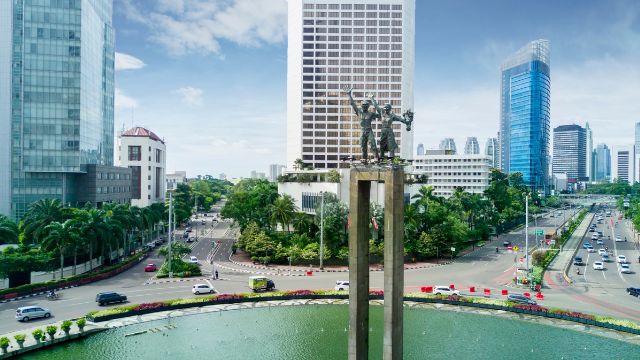
Deploying an Expatriate Workforce in Indonesia Compliantly: A Guide for Employers
19 Jul, 20247:20In the last few years, amid a drive to increase energy and industrial production, the Indone...

In the last few years, amid a drive to increase energy and industrial production, the Indonesian government has been pushing for growth in its oil and gas, chemical, and industrial industries. It has sought investment to fuel its continued recovery from the COVID-19 pandemic.
Major engineering, industrial and technical projects in the country often demand a high level of expertise and technical knowledge, relying on a global workforce to be effective. Companies that win projects in Indonesia often need a combination of local and foreign workers to fill skills gaps, and it’s critically important to understand the country’s migrant worker laws.
Employers must navigate the complex process of obtaining work visas to hire expatriate workers in Indonesia. The Indonesian government strongly focuses on employing locals over expatriate or foreign workers in all industries, and companies must be able to justify that they cannot source skills and experience from the local employment pool before they can employ expatriates. The employer will be responsible for most of the work in obtaining the permits. In addition, the hiring company must also be based in Indonesia, meaning a local business presence is required.
This guide is intended to offer advice and more information to companies looking to hire expatriates with experience and skills in Indonesia, including the key steps and how an Employer of Record can support recruitment in the region.
Understanding the Indonesian Work Visa System
Foreign workers planning to work in Indonesia need a working visa or KITAS (Kartu Izin Tinngal Terbatas). There are various versions of the KITAS depending on the length of stay and the type of work that will be completed. Typically, the KITAS lasts between 6 and 12 months and can be extended for up to five years. The KITAS is a physical card that shows the holder has a Temporary Stay Permit. Once the employee has permission to stay, they will also need separate permission to work.
Sponsorship and Application Process
Employers must act as sponsors to bring expatriate workers to Indonesia and submit the necessary documents to the Ministry of Manpower. These documents include a letter of intent, employment contract, and proof of company registration. To ensure a smooth application process, it is essential to engage the services of a reliable immigration consultant or legal advisor.
Manpower Utilization Plan (RPTKA) and IMTA
Employers must obtain a Manpower Utilization Plan (RPTKA or Rencana Penempatan Tenaga Kerja Asing) before applying for work visas for expatriate workers. The RPTKA outlines the number of required expatriate workers, their job descriptions, and the duration of their employment. It is crucial to ensure compliance with local labour market regulations and demonstrate the necessity of hiring expatriate workers over local talent.
Employers must also obtain a work permit, or IMTA (Ijin Mempekerjakan Tenaga Kerja Asing, or ‘Permission to Employ Foreign Workers’), while applying for the RPTKA. The application includes a USD $100 fee for the visa length to the Skill and Development Fund, known as the DPKK fund. This Fund is collected as a fee for using foreign workers over Indonesian workers and is used to develop the country’s workforce.

Finally, the employer will also need to obtain a Police Report Letter (STM) from the police department and register with the local area’s population office to obtain a Certificate of Registration for Temporary Resident (SKPPS) permit. This is completed by applying to the Civil Departments within 14 days of receipt of the KITAS.
Once these steps have been completed, the employee will be formally eligible to work in Indonesia for their permit. This process must be completed every year to extend employment. Still, once the worker has lived in Indonesia for three years, they can instead apply for a permanent residence permit or KITAP, which can be renewed every five years.
Employment Regulations for Expatriate Workers
Employers must comply with various employment regulations when hiring expatriate workers in Indonesia. These include providing a written employment contract in Indonesian, adhering to the minimum wage requirements, and contributing to social security schemes. Employers are also responsible for ensuring the proper registration of their expatriate workers with the local immigration authorities.
Employees can also bring their families and dependents for extended projects and apply for Indonesian visas as part of the KITAS. These dependents would need to use their work permits to find work legally, which involves the same process as the original employee.
Tax Obligations for Expatriates in Indonesia
Employers are responsible for deducting and remitting taxes for their expatriate workers. Understanding the tax obligations and ensuring compliance with the Indonesian tax laws is essential. Failure to do so may result in penalties and legal consequences.

The benefits of an Employer of Record (EOR)
Employers looking to staff projects in Indonesia have many different factors to consider – the lengthy and complicated visa and work permit process, local laws and regulations, tax and benefits, and even the rules and regulations in different municipalities in the country.
In addition, contracts and other information must be kept in Indonesian, which requires additional local expertise. Failing to maintain the correct documentation or allowing a visa to expire can result in employees being deported, companies being blocked from the country, and daily fines.
With the risks of financial penalties if improperly employed and managed, plus the complexity of managing a local entity, the best alternative to streamline a project in Indonesia is to use an Employer of Record, or EOR like NES Fircroft, who can act as a sponsor and employer on behalf of a company and employee.
An EOR will be based locally and has up-to-date knowledge of Indonesian employment law for expatriates. The EOR will have experience engaging with the Ministry of Manpower in Indonesia and the various visas available. With a deep understanding of the process, they can guide a company into obtaining the correct documentation and avoiding delays, significantly increasing the speed of deploying an expatriate skillset where it is required.
The benefits of using NES Fircroft as your Employer of Record
NES Fircroft can help with more than just sourcing and compliantly placing candidates.
With offices in more than 45 countries and decades of experience in international expansion, we can help you hire employees quickly, compliantly, and with minimal risk.
With NES Fircroft managing your talent, we can resolve your legal entity and employment requirements, ease your payroll burden, manage tax queries and ensure immigration labour law compliance. We are award-winning in compliance and payroll, so your expansion plans are safe.
Contact us to discuss how we can support your Indonesian projects.









